Crucial M550 Review: 128GB, 256GB, 512GB and 1TB Models Tested
by Kristian Vättö on March 18, 2014 8:00 AM ESTRandom Read/Write Speed
The four corners of SSD performance are as follows: random read, random write, sequential read and sequential write speed. Random accesses are generally small in size, while sequential accesses tend to be larger and thus we have the four Iometer tests we use in all of our reviews.
Our first test writes 4KB in a completely random pattern over an 8GB space of the drive to simulate the sort of random access that you'd see on an OS drive (even this is more stressful than a normal desktop user would see). We perform three concurrent IOs and run the test for 3 minutes. The results reported are in average MB/s over the entire time.
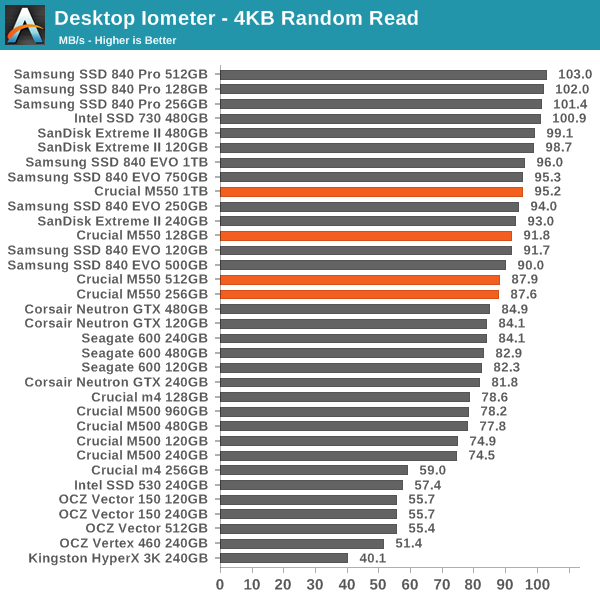
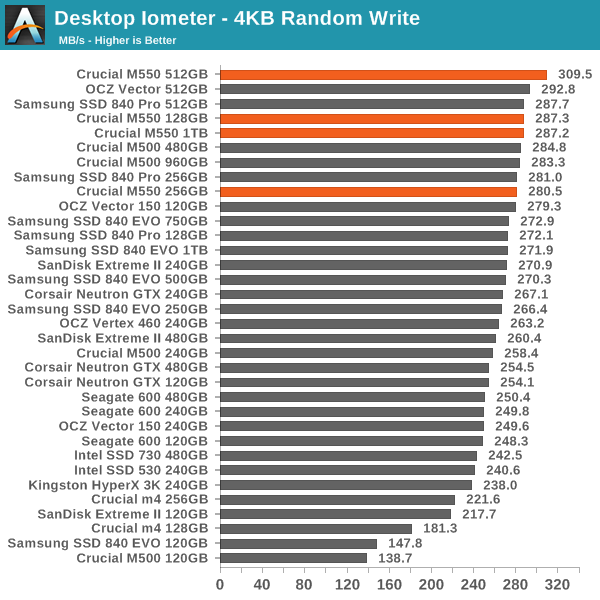
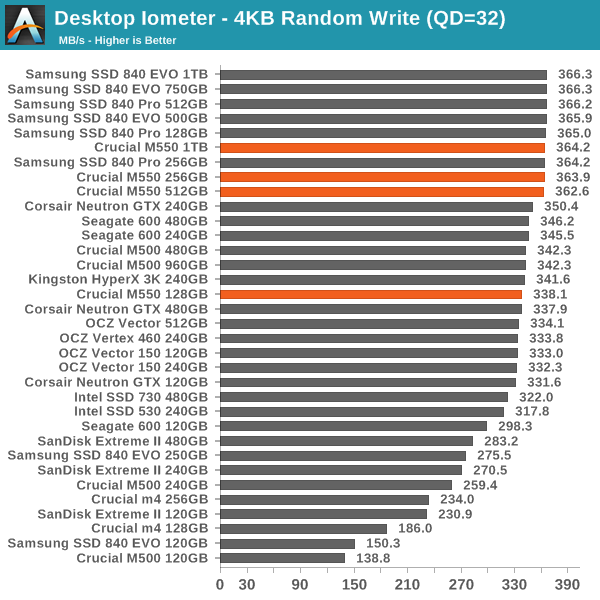
Random performance is strong when dealing with an empty drive but as the two previous pages show the big picture isn't as pleasant. The difference between 64Gbit and 128Gbit NAND is very clear here as the M550 is up to twice as fast as the M500 at the smaller capacities.
Sequential Read/Write Speed
To measure sequential performance I ran a 1 minute long 128KB sequential test over the entire span of the drive at a queue depth of 1. The results reported are in average MB/s over the entire test length.
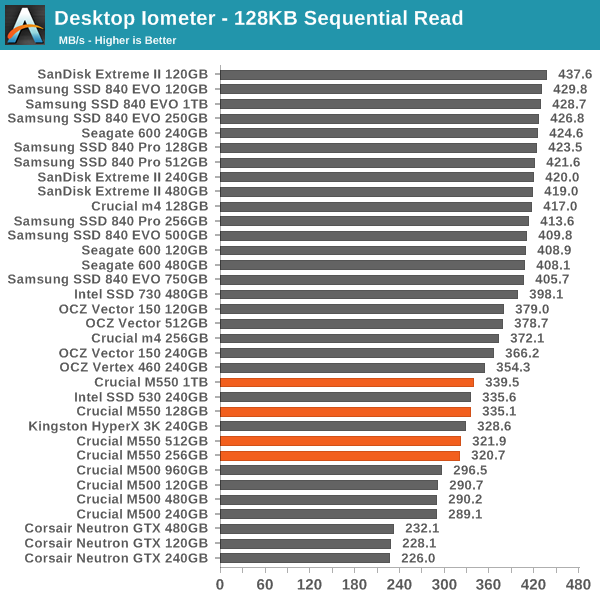
Sequential speeds are up quite a bit from the M500 as well but the read performance is still a bit lacking.
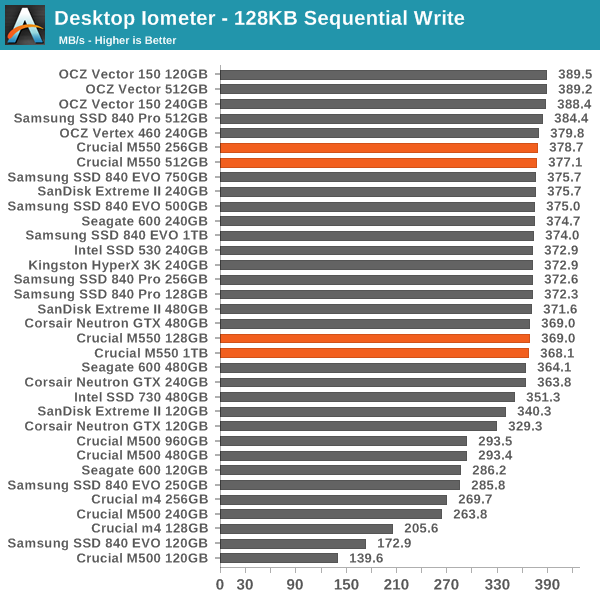
AS-SSD Incompressible Sequential Read/Write Performance
The AS-SSD sequential benchmark uses incompressible data for all of its transfers. The result is a pretty big reduction in sequential write speed on SandForce based controllers. Again, the M550 shows a decent improvement over the M500, particularly at the lower capacities.
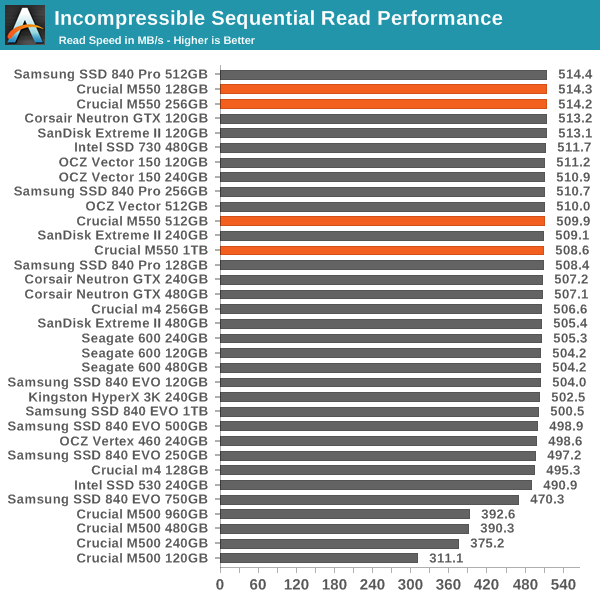
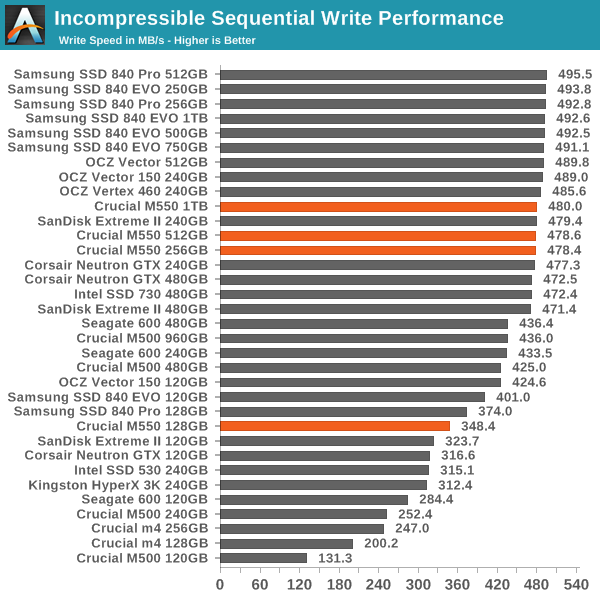










100 Comments
View All Comments
tech6 - Tuesday, March 18, 2014 - link
I don't think that the M550 is so much a "performance" variant as it is a direct replacement for the 500. Most likely what is happening here is that the benchmark for value SSDs has just been lifted slightly. Once the M500 disappears the 550 will assume its price point.Kristian Vättö - Tuesday, March 18, 2014 - link
The thing is, the M550 doesn't replace the M500. The M500 will continue to be available and the M550 is simply Crucial's "high-end" offering.ZeDestructor - Tuesday, March 18, 2014 - link
Interesting... Much like tech6, I was expecting the M500 to die off peacefully... Any details from micron on why they're doing that?For now, I should go and buy an M500 480GB already... They're really cheap...
Kristian Vättö - Tuesday, March 18, 2014 - link
There are still some cost savings from the 128Gbit NAND at the smaller capacities and it's possible that the controller/DRAM configurations are slightly cheaper as well. Could be that Crucial/Micron is also using slightly lower quality NAND for the M500 since the extra space reserved for RAIN makes sure that is not an issue.hojnikb - Tuesday, March 18, 2014 - link
Its interesting, that they are not using more dies per package (as opposed to samsung with evos).I'm guessing using less packages and possibly smaller pcb could yield additional cost savings for crucial/micron... Or is this not the case...? Also they could go with dramless like toshiba is doing with their q series ?
V500 anyone ?
hojnikb - Tuesday, March 18, 2014 - link
So basicly m500 is crucials/microns "low" end offering now.Just like the crappy v4 (that drive is really slow and im ashamed to own one) that was in the m4 days.
tim851 - Tuesday, March 18, 2014 - link
I hope so. I find the speed of SSDs to be sufficient for now and I'd like to see them work on pricing rather than performance.hojnikb - Tuesday, March 18, 2014 - link
Yeah i hope so too. I'm planning to buy 480GB/1TB version sometime this year to replace that sandforce joke i'm having now (intel's 330) and ditch HDDs alltogether.StevoLincolnite - Wednesday, March 19, 2014 - link
I'm running a several year old OCZ Vertex 2 64Gb SSD... Been solid.One thing I have never said however was: "Gee this SSD is slow!". - Mostly the main advantage SSD's brought to the arena was the stupidly low latencies compared to mechanical drives.
Price needs to still come down, capacities need to keep increasing in the low-end and mid-range segments.
Literally the single *biggest* upgrade that a majority of PC's could use is simply an SSD, regardless of it's transfer rates.
Even on ancient 6-7 year old Core 2 PC's...
trichome333 - Wednesday, March 19, 2014 - link
I agree mate. Just got a M500 240gb and I literally feel like a dunce for not moving earlier.